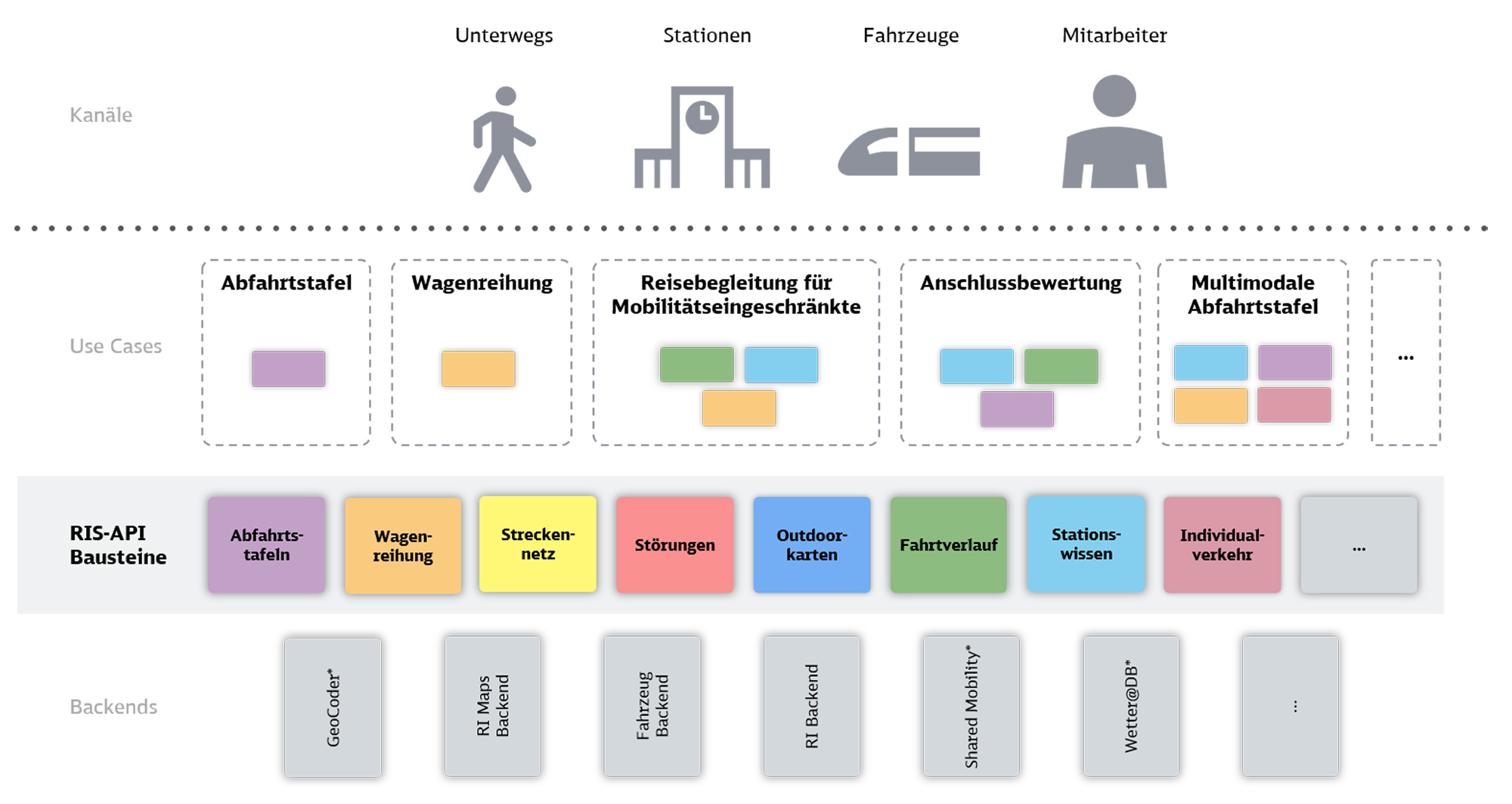New customer-centric data model
Article: RIS-API modules for better traveller information
10/2020 – Cooperation agreement between DB Systel and "Traveller Information" Group Division with a focus on central development and publication of APIs
In order to make more effective use of Deutsche Bahn’s data stream, DB Systel and the “Traveller Information” (TR) Group Division are breaking new ground in the “Digitalization and Technology” Board Division. As part of an innovative collaboration model, they are tapping into traveller information that previously existed in various locations within the DB Group in order to make it centrally available and easier to link. The aim of this partnership is to achieve optimum use of Deutsche Bahn’s data stream in the Traveller Information System application programming interface, known as RIS-API. Application programming interfaces (API) are used to integrate existing data and functions into new digital applications.
In the future, all departments within the DB Group will be able to use RIS-API modules to develop new digital services in a fast, functional and cost-effective manner. RIS-API modules represent individual services. They provide certain business functions such as the coach sequence or timetable data within the context of traveller information. Each individual module can be freely combined with one other.
„There is a very clear focus on data consistency with a view to improving our passenger services."

Central use of the RIS-API guarantees data consistency between different information channels, ranging from displays at railway stations, employee apps, portals or in-train passenger information systems.
The need for a focus reset
“In 75 percent of all cases, it doesn’t make sense for departments to develop their own applications from start to finish,” says Sebastian Frank, Lead Business Engineer, TR Group Division. It is more appropriate to use the predefined RIS-API modules to implement ideas for a use case in a fast and cost-effective manner, thus making Deutsche Bahn’s treasure troves of data more visible and usable. Errors previously caused by manual processes and media disruptions are also avoided in this way.
„In 75 percent of all cases, it doesn’t make sense for departments to develop their own applications from start to finish."

The first few modules of this new data model are now gradually being deployed. The TR Group Division has partnered with DB Systel on this project. “In the TR Group Division, we are very good at customer-centric thinking when it comes to traveller information. We also excel at optimizing processes, designing data models and consolidating data,” says Sebastian Frank. “However, we need a partner whose area of expertise is API design and development, and who can support us from the design stage right through to development and operation. We found this in abundance amongst our colleagues from the service teams in the Business Hub at DB Systel.”
A cooperation agreement for working better together
However, this is not a classic client-contractor transaction but rather a partnership of equals based on a cooperation agreement. “It clearly sets out the terms of the partnership, for example, how we work together, when coordination meetings are held, how joint decisions are made and how we work together to find customers for the RIS-API,” explains Claudia Horn, DB Systel Business Consultant at the API platform Business Hub.
„We share the responsibility, the cost, the work and, of course, the success."
Why undertake a project in this way? The risk and revenue sharing model is the business basis of our partnership. In other words, project costs are shared, as are subsequent revenues, which are then directly reinvested into further development as well as the development of new functions and services. In practical terms, this means checking the feasibility of our joint ideas and taking each step of the project journey together.
Another notable advantage here is linking the networks. Each cooperation partner has many contacts within the DB Group who require these RIS-API modules. Together, however, they naturally achieve a far greater reach within the DB Group. This large number of customers ensures that the services do not become special solutions. Rather, they are designed to be of interest in as many areas as possible.
Tailoring traveller information to the individual
Tim Leiner really appreciates another benefit: “Much discussion is needed to achieve clarity on the central data model and its functionalities. Even though this is sometimes arduous and time-consuming, it makes the product much more stable, and a lot more customer-focused. It’s worth the effort.” This is one of the reasons why the RIS-API output is remarkable. The current agenda allows for the publication of the following four modules by the end of the year: Routes, Departure Boards, Connecting Services and Station Information, with the latter including indoor routing for 38 major stations that have already been digitalised. The Event module, which provides data about route changes, will follow at the beginning of next year. “Enhancing data information is one thing, but tailoring traveller information to the individual is a whole other matter,” stresses Sebastian Frank. “We will therefore also integrate map-centric traveller information or rail replacement service information.” A partnership of equals, in which risk and revenue are shared, makes the RIS-API not only a hothouse for delivering optimum services but also a driver of innovation.



